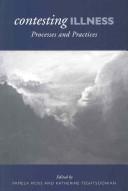| Listing 1 - 4 of 4 |
Sort by
|

ISBN: 1442687738 9781442687738 9780802093653 0802093655 9780802095121 0802095127 9780802093656 1442692057 Year: 2008 Publisher: Toronto, [Ontario] ; Buffalo, [New York] ; London, [England] : University of Toronto Press,
Abstract | Keywords | Export | Availability | Bookmark
 Loading...
Loading...Choose an application
- Reference Manager
- EndNote
- RefWorks (Direct export to RefWorks)
The relationship between power and illness is the subject of limited discussion despite it being one of the most important issues in health-related policies and services. In an effort to correct this, Contesting Illness engages critically with processes through which the meanings and effects of illness shape and are shaped by specific sets of practices. Featuring original contributions by researchers working in a number of disciplines, this collection examines intersections of power, contestation, and illness with the aid of various critical theoretical frameworks and methodological approaches. The contributors explore experiences of illness, diagnosis, and treatment, and analyse wider discursive and policy contexts within which people become ill and engage with health care systems. Though each essay is unique in its approach, they are linked together by a shared focus on contestation as a conceptual tool in considering the relationship between power and illness. Rather than focus on a single example, the contributors address different contested illnesses (chronic fatigue syndrome and environmental illness, for instance) as well as the contested dimensions of illnesses that are accepted as legitimate such as cancer and autism. Contesting Illness offers valuable insights into the assumptions, practices, and interactions that shape illness in the twenty-first century.
Chronic diseases --- Chronically ill. --- Chronically ill --- Long-term care of the sick --- Sick --- Diseases, Chronic --- NCDs (Noncommunicable diseases) --- Non-communicable diseases --- Non-infectious diseases --- Noncommunicable diseases --- Diseases --- Social aspects. --- Government policy. --- Psychological aspects. --- Care. --- Care and treatment --- Patients --- Psychology
Multi

ISBN: 9781442672819 Year: 2016 Publisher: Toronto, Ont. University of Toronto Press
Abstract | Keywords | Export | Availability | Bookmark
 Loading...
Loading...Choose an application
- Reference Manager
- EndNote
- RefWorks (Direct export to RefWorks)


ISBN: 9781442687738 9780802095121 Year: 2016 Publisher: Toronto, Ont. University of Toronto Press
Abstract | Keywords | Export | Availability | Bookmark
 Loading...
Loading...Choose an application
- Reference Manager
- EndNote
- RefWorks (Direct export to RefWorks)
Multi

ISBN: 9781442619708 Year: 2022 Publisher: Toronto, Ont. University of Toronto Press
Abstract | Keywords | Export | Availability | Bookmark
 Loading...
Loading...Choose an application
- Reference Manager
- EndNote
- RefWorks (Direct export to RefWorks)
| Listing 1 - 4 of 4 |
Sort by
|

 Search
Search Feedback
Feedback About UniCat
About UniCat  Help
Help News
News